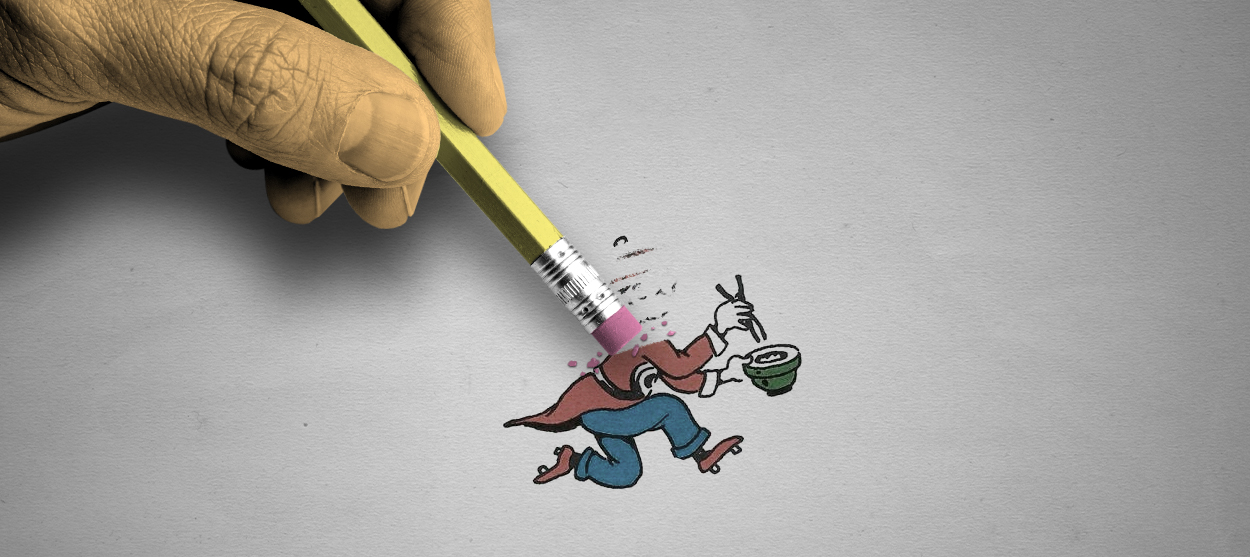Why the Dr. Seuss 'cancellation' is chilling
If these transgressions can get an author moved to the "problematic" list, who and what will escape the purges?


A free daily email with the biggest news stories of the day – and the best features from TheWeek.com
You are now subscribed
Your newsletter sign-up was successful
The latest culture-war battle is raging around "Dr. Seuss," the American children's author and artist whose whimsical and warm-hearted work has won him a global following. On March 2, Dr. Seuss Enterprises, which licenses and publishes his books, announced that it is dropping six of the 60-plus titles because of "hurtful" racial stereotypes. This has been met with an outcry about "cancel culture" and book-banning from conservatives as well as some centrists and liberals worried about "politically correct" excesses. Others counter that there is no "cancellation," just a corporate decision to stop reprinting books that are jarringly dated due to evolving cultural attitudes (and that will remain widely available even without new editions).
As often happens, each side has a point.
There is nothing new about revising or even shelving published works in deference to concerns about racism and other bigotries. Nor is there anything wrong with it. In Victorian England, hardly a bastion of political correctness, Charles Dickens changed some language in reprints of Oliver Twist to cut down on references to the villainous Fagin as "the Jew" after a correspondence with a Jewish woman who criticized him for feeding anti-Semitic prejudice. In the 20th Century, a 1939 Agatha Christie novel whose original title is now unspeakable in polite society was reissued just a few years later as Ten Little Indians (And Then There Were None in the United States); the children's counting rhyme on which the title was based was also changed in the text. In Roald Dahl's 1964 classic Charlie and the Chocolate Factory, the Oompa-Loompas working at Willy Wonka's factory were originally African pygmies. Just a few years later, controversy erupted; Dahl ended up agreeing with his critics and replaced the Black workers with pink and golden-haired "dwarvish hippies."
The Week
Escape your echo chamber. Get the facts behind the news, plus analysis from multiple perspectives.

Sign up for The Week's Free Newsletters
From our morning news briefing to a weekly Good News Newsletter, get the best of The Week delivered directly to your inbox.
From our morning news briefing to a weekly Good News Newsletter, get the best of The Week delivered directly to your inbox.
There is little question that many depictions of racial, ethnic, or religious minorities in books or films from past eras are now unpalatable, with good reason. The same goes for portrayals of women and gays.
And yet there are valid reasons to see the publisher's withdrawal of those six Dr. Seuss books as a worrying sign.
For one, the decision comes in tandem with other moves intended to demote Dr. Seuss (Theodor Seuss Geisel) from his iconic status. On the same day, President Biden omitted any mention of Dr. Seuss from his official proclamation to mark Read Across America Day, breaking a tradition started by Barack Obama. The event, first established by the National Education Association in 1998, has always honored Dr. Seuss: His birthday was picked as its date. Now, the NEA says that Read Across America is no longer affiliated with Dr. Seuss Enterprises, and at least one school district in Virginia has been instructing schools to downplay the day's connection to Dr. Seuss because of "strong racial undertones" found in his work.
What's more, the critique of those "racial undertones" has been often tendentious to the point of distortion. Thus, a CNN article asserts that Geisel, who was also a political cartoonist, "had a long history of publishing racist and anti-Semitic work, spanning back to the 1920s when he was a student at Dartmouth College. There, Dr. Seuss once drew Black boxers as gorillas and perpetuated Jewish stereotypes by portraying Jewish characters as financially stingy." No mention is made of the fact that by the 1940s, the cartoonist had emerged as an outspoken foe of anti-Semitism — a stance that would later earn him the title of "honorary Jew," bestowed by Jerusalem mayor Teddy Kollek in 1969 — and of anti-Black racism. A 1942 cartoon skewered racial discrimination in U.S. war industries: An entrance for "Negro job-hunters" is shown leading to an impenetrable maze.
A free daily email with the biggest news stories of the day – and the best features from TheWeek.com
Regrettably, many of Dr. Seuss' wartime cartoons also featured the blatant anti-Japanese racism that was a staple of U.S. war propaganda. Yet in later years, his children's books often served as parables denouncing racial prejudice and xenophobia. Horton Hears a Who, written after a visit to Japan, famously declared, "A person's a person, no matter how small," and was dedicated to a Japanese friend, Mitsugi Nakamura.
To erase this complicated history really does smack of "cancellation."
No less disturbing, much of the current pushback against Dr. Seuss is based on a 2019 paper by Katie Ishizuka and Ramón Stephens that consistently interprets his work in the most negative light and peddles extreme ideological dogma. Take Dr. Seuss's 1961 book The Sneetches, which has been widely praised for its anti-racist message: Birdlike creatures with stars on their bellies scorn and bully their plain-bellied cousins until a wily salesman brings a device that can add or remove stars, and all the sneetches change so many times they get thoroughly mixed up and decide to treat everyone equally. But Ishizuka and Stephens attack the poem as insidious because it teaches that color shouldn't matter. Echoing Kansas State University scholar Philip Nel, they also read a sinister racist subtext into The Cat in the Hat: The magical cat supposedly resembles images from Black minstrelsy and exists only to entertain two white children.
If such takedowns can get an author moved to the "problematic" list, who and what will escape the purges? Some who support the withdrawal of the six Dr. Seuss books argue that even subtle racism must be "exorcised" from our cultural legacy, especially works intended for children. But if the exorcism targets racial codes so subtle that they are invisible or innocuous to the naked eye (a black-and-white cat wearing white gloves represents racist minstrelsy?), it could do much more harm than good, fostering both paranoia and backlash. And imagine how much art and literature will have to be junked if we ever apply the same magnifying lens to gender stereotypes.
Nor is it clear that, as Boston Globe writer Ty Burr suggests, the withdrawn books will still be available in libraries and on websites like Amazon: once a work has been stigmatized as "harmful," libraries will undoubtedly come under pressure to remove it, and Amazon sometimes drops books it considers offensive.
The answer isn't that anything goes; it's that we can use common sense to distinguish between old texts or images that degrade or dehumanize members of a group and ones that reflect dated but non-malignant stereotyping. Among the canceled Dr. Seuss books, for instance, If I Ran the Zoo really does contain some shockingly racist iconography of Africans as thick-lipped, potbellied, half-naked savages in grass skirts. On the other hand, the supposedly racist depiction of a Chinese man in To Think That I Saw It on Mulberry Street involves an actual costume worn in parts of China at the time the book was published (1937), a bowl of rice, and chopsticks. (The original edition also gave the man bright yellow skin and a pigtail and referred to him as a "Chinaman," but Dr. Seuss himself later made changes.) Mildly stereotypical? Sure, but much the same way as, say, the depiction of a Jewish man wearing a yarmulke and eating a bagel or a Scotsman playing bagpipes in a kilt. Many Asian-Americans have said they don't find the picture offensive, and effectively purging the book from the Dr. Seuss canon because of it seems excessive.
Should children's literature adapt to a more racially and ethnically diverse, more gender-equal society? Of course. But the way to do that is to add new classics, not discard old ones. Given the speed of cultural shifts today, people are right to worry about harsh and unforgiving judgments of dated attitudes. And when a writer who cheers the Dr. Seuss "cancellation" warns that "we will have to get rid of other things, too," we are right to feel a chill.
Cathy Young is a columnist for Newsday and a contributing editor at Reason magazine. Her book Ceasefire!: Why Women and Men Must Join Forces to Achieve True Equality was published in 1999.
-
 How the FCC’s ‘equal time’ rule works
How the FCC’s ‘equal time’ rule worksIn the Spotlight The law is at the heart of the Colbert-CBS conflict
-
 What is the endgame in the DHS shutdown?
What is the endgame in the DHS shutdown?Today’s Big Question Democrats want to rein in ICE’s immigration crackdown
-
 ‘Poor time management isn’t just an inconvenience’
‘Poor time management isn’t just an inconvenience’Instant Opinion Opinion, comment and editorials of the day
